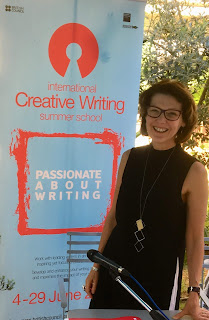Athens mother of arts and eloquence: N M Browne
I am writing this having just had the delightful experience of teaching creative writing at the British Council/Kingston University Summer School in Athens.
It was a great experience because it was in Athens; because it was in the Summer; and because I got to see the Acropolis for the first time. Need I go on? It was also great because I really like teaching as it obliges me to think about writing in a slightly more analytical way, to formulate different ways of expressing familiar ideas and to challenge some of my lazier habits.
The main reason it was great, however, was because the people I met were all amazing. The majority were native Greek speakers whose grasp of even idiomatic English was phenomenal.This always makes me feel inadequate and humble because all I do is write in my native language and these ‘students’ have jobs which involve specialist knowledge, in engineering, business and God knows what altogether and yet they can also write interestingly and well in a foreign language. I know, it made me feel almost as badly about my monolingual state as I felt guilty about Britain’s continued retention of the Elgin marbles. (Go to the New Archaeology Museum and I guarantee you will feel the same way)
The experience has made me feel that I should brush up my appalling French, or try to remember more words in German than 'spiegelei,' 'bratkartofelln' and 'verkehrsampel,' which for some reason figured heavily on the syllabus back in the day, but it also got me thinking about the business of teaching.
I had a very rigorous language teacher at school who pointed out my many grammatical errors so frequently that I can’t speak a sentence in any language but English and sometimes not even then. I am not going to blame him for my failure to learn a single word of Greek - it is over forty years ago and I think the statute of limitation on blame has run out by now. I can still conjure his face and indeed his (possibly unintentional) sneer and he is a salutory reminder to me as a teacher to be careful that rigour does not slip into discouragement. We carry the imprint of our teachers’ attitudes long after whatever they taught is us throughly lost. I remember my fear of messing up the pluperfect even though I have forgotten all my French verbs both regular and irregular, those that take être and those that take avoir and much good did knowing there was a difference ever do me.
I hope that I have not inadvertently criticised where I should have encouraged, but I am certain that I have. All teachers, particularly those of us working in the creative arts, walk this tightrope between over-criticism and over-praise. We all need to feel that we are not wasting our energy, we all want to improve, but to do so by changing as little as possible. Or is that just me?
I don’t know how much my students’ English fluency and general confident creativity was down to good teaching or to their personal application, but I feel I must salute every teacher who must have had a part in it.
So much of learning is personal that the most we can do is to help our students learn how to learn more, but that is not an easy thing to teach. So, well done Greek teachers, and for all my students, wherever we met, I hope you are still learning, still discovering, because learning to write is a lifelong study.

Comments